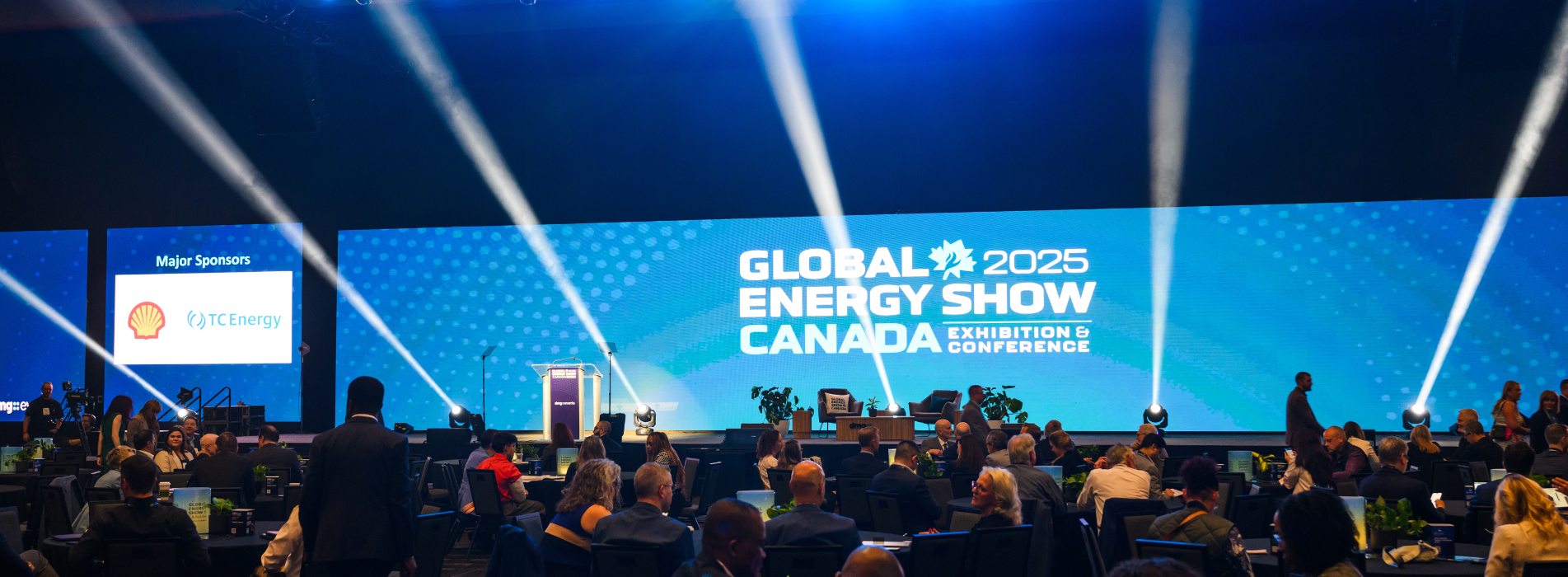Musabbeh Al Kaabi
CEO, Upstream
As Canada’s Leading Energy Event, the Global Energy Show is the largest B2B exhibition and conference engaging with industry buyers and sellers, stakeholders and partners, CEOs and young professionals together to share knowledge and fuel innovation in the ever-changing energy landscape.
Gain exclusive visibility and connect with key decision-makers across the energy sector. Elevate your brand while positioning your company as a leader in shaping the future of energy.
The conferences at the Global Energy Show bring together industry leaders to tackle energy security, climate responsibilities, and global demand challenges. The Executive Conference will gather industry leaders, government representatives and major global players for a national dialogue that is critical to developing practical frameworks, policy, actions and guidelines to shape “Canada’s Energy Mandate to 2030”.
Our Media & Association Partners benefit from unique access to the global forefront of natural gas, LNG, hydrogen, climate technologies, energy manufacturing, and low carbon solutions.
Take advantage of preferred rates at partner hotels and airlines of Global Energy Show Canada!
Step into your volunteer role and enjoy Global Energy Show Canada conference and Exhibition

Canada is stepping into a new chapter of energy leadership. Guided by fresh federal direction and pragmatic policy, nation building projects have been announced with LNG and nuclear at the forefront, and an MOU signed between Alberta and Ottawa to strengthen collaboration and resilience across the energy sector with a new pipeline connecting Alberta to the West Coast, and the construction of the world’s largest carbon capture project: Pathways Plus. By creating faster approvals, and an investor friendly regulatory environment, the energy sector is poised to unlock major private-sector capital produce the lowest carbon bitumen, and advancing Indigenous economic development, and creating hundreds of thousands of new jobs fulfilling the potential of Canadian energy resources.
Global Energy Show Canada 2026 is where this transformation comes together. As Canada’s largest energy event, the show connects ambition with action, bringing together industry executives, policymakers, Indigenous leaders, and innovators to shape the blueprint of a modern energy state for a demanding world.
Competitive, sustainable, and built for the future.
Delegates
Countries Represented
Speakers
Streams

 Financial Capital: Fueling Growth Through Investment
Financial Capital: Fueling Growth Through Investment

Global capital markets, pension funds, and sovereign investors are backing Canada’s energy resurgence, recognizing long-term value across hydrocarbons, LNG, hydrogen, and infrastructure. With the Carney government signalling both stability and ambition, financing is flowing into upstream and midstream expansion, CCUS deployment, and Indigenous equity participation. Recent moves by AltaGas, Keyera, and Enbridge reflect a strategic pivot toward pipeline optimization and export readiness. This theme explores how strategic capital allocation is driving the next wave of investment, and where it’s poised to land.
 Human Capital: Exporting Canadian Capability to a Demanding World
Human Capital: Exporting Canadian Capability to a Demanding World

Canadian energy professionals are powering projects around the world, from engineering and operations to Indigenous-led governance and emerging technologies. Whether consulting on infrastructure, deploying hydrogen systems, or advancing CCUS, Canadian talent is shaping global energy outcomes with precision and reliability. This theme is designed to spotlight how Canada’s energy workforce is not just meeting domestic needs; it’s shaping global energy outcomes.
 Infrastructure Capital: Building the Backbone of Energy Expansion
Infrastructure Capital: Building the Backbone of Energy Expansion 
Canada’s path to energy superpower status is being paved by nation-building infrastructure projects of generational scale, billion-dollar undertakings that fuse resource development, climate ambition, and geopolitical reach. Under Mark Carney’s emerging strategy, pipelines, ports and railways can accelerate exports and secure supply chains. Edmonton’s hydrogen hubs, Alberta’s carbon storage networks, Ontario’s nuclear revitalization, and Northern Quebec’s critical minerals routes are signals of a country unlocking its full potential. With the Building Canada Act fast-tracking project approvals, expanded Indigenous ownership incentives, and targeted infrastructure capital, this theme will explore how Canada is stepping into a leadership role not just in energy transition, but in the building of the modern energy state.
 Political Capital: Aligning Policy with Energy Ambition
Political Capital: Aligning Policy with Energy Ambition

Canada’s energy future hinges on political will, the ability to align policy frameworks with investment timelines, infrastructure needs, and global market realities. As geopolitical dynamics shift and energy security becomes paramount, and a government signaling a pragmatic approach to climate and competitiveness, there’s an opportunity to position Canada as a policy-driven energy leader. From G7 diplomacy to bilateral trade with the U.S. political leadership is shaping the contours of Canada’s energy mandate. This theme explores how political capital, at federal, provincial, and Indigenous levels, is being deployed to unlock infrastructure, attract global investment, and ensure Canada’s voice is heard in the international energy dialogue.
 Technology Capital: Scaling Innovation with Global Impact
Technology Capital: Scaling Innovation with Global Impact

From AI-driven drilling analytics to autonomous haul trucks in the oil sands, Canadian energy firms are deploying technology to boost productivity, reduce costs, and enhance safety. But innovation isn’t happening in isolation, cross-border R&D, global tech partnerships, and multinational innovation clusters are scaling productivity and safety. This theme explores how Canada’s digital and industrial innovations are contributing to global best practices in CCUS, renewables, and hydrogen.
 Resource Capital: Connecting Canada's Energy to Global Markets
Resource Capital: Connecting Canada's Energy to Global Markets

Canada’s energy wealth, from the world’s fourth-largest oil reserves to abundant natural gas, uranium, and renewables, is in high demand. The $40+ billion LNG Canada project, now operational, marks the largest private investment in Canadian history. With oil production at record highs and new export routes via Trans Mountain and Coastal GasLink, Canada is expanding its reach, though analysts warn additional capacity will be needed by 2026. This theme explores how Canada is capitalizing on its resource endowment through strategic exports, infrastructure expansion, and regulatory clarity.
 Indigenous Capital: Reclaiming Ownership and Driving Prosperity
Indigenous Capital: Reclaiming Ownership and Driving Prosperity

Indigenous communities are leading a transformation in energy development — reclaiming ownership, driving prosperity, and inspiring new models of reconciliation. Projects in hydrogen, renewables, and CCUS are attracting global interest and setting a precedent for inclusive development. This theme highlights not only the economic empowerment underway but also the potential for international collaboration rooted in Indigenous knowledge and sovereignty.
 Social Capital: Earning Trust in a Complex Energy Dialogue
Social Capital: Earning Trust in a Complex Energy Dialogue

Energy development must earn public trust, not just at home, but among global observers. This theme explores how Canada is demonstrating leadership through transparency, ESG excellence, and meaningful community engagement. It’s about earning credibility in a complex energy landscape and sharing lessons learned with the global energy community.
June 9, 2026 | 10:00 – 12:30
Bringing together the CEOs and senior officials driving Canada’s ambition to become a true energy superpower, the opening plenary will address how shifting geopolitical dynamics are shaping the future of Canadian energy. From expediting nation-building projects and attracting investments to new customer markets and trade opportunities, the plenary will set the stage for bold strategies that align policy, capital, and innovation to secure Canada’s leadership in a rapidly changing energy landscape.
June 9, 2026 | 2:00 – 4:00 / June 10 & 11, 2026 | 10:00 – 4:00
The conference will be delivered across three streams: Gas & LNG, Investment, and AI & Power. This year’s Global Energy Show Canada invites executive leaders to address the most pressing issues and opportunities in Canadian energy, setting the stage for a bold dialogue where every form of capital – financial, political, resource, infrastructure, human, technology, Indigenous, and social – is converging to ignite growth, innovation, and inclusivity.

Canada’s natural gas industry is entering a new LNG era. With the first exports underway, expansion projects breaking ground, and long-term offtake agreements securing market share, Canada is emerging as a reliable international partner in the global energy addition. This stream explores the conditions required to sustain Canada’s rise as a leader amid growing LNG demand.

Energy growth demands capital in all its forms. With the announcement of nation-building projects, loosened regulations, and renewed scrutiny of interprovincial barriers, strategic capital allocation is shaping the next wave of growth. Canada’s next chapter is defined by private-sector-led growth, paired with government alignment, creating the conditions for bold foreign investment and economic growth.

In an era where energy and technology are inseparable, Canada is accelerating its ambition to win the AI race. Leveraging its resource wealth, robust power infrastructure, and innovation ecosystems within a pro-business environment, Canada is establishing itself as a global hub for AI and data centres, driving economic growth and digital transformation across the energy sector.
Opening Plenary
Chief Executives, government officials and global industry leaders set the stage with high-level strategic insights on the macro trends shaping Canada’s energy landscape and global opportunity, providing a shared narrative of Canada’s energy leadership.
Executive Dialogues
A dedicated series of discussions with industry leaders and ministers sharing candid perspectives on leadership journeys, visions, and corporate strategies, revealing executive thinking that drives Canada’s energy future.
Strategic Panels
Diverse voices across the energy value chain, policy and Indigenous communities engage in dynamic debate on key issues at the forefront of the energy discussion, from investment and infrastructure, to partnerships and decarbonization strategies, experts break down the complexities of Canada’s energy landscape.
Leadership Keynotes
Senior officials deliver focused updates and thought leadership on business, policy and Canada in a global context, providing timely announcements and actionable takeaways that shape Canada’s energy priorities.
An invitation-only forum that connect ministers, C-suite executives and global business leaders to foster high-level discussions, collaboration and advance connections that shape the next chapter of Canadian energy. Global Energy Club harnesses the power of collaboration to secure a sustainable, affordable and resilient energy future.
Broaden your network and forge new connections at our daily networking receptions, welcoming business leaders, entrepreneurs, innovators and the next generation of industry talent. Taking place from 4pm on Level 2, the networking receptions are informal gatherings that help build relationships, exchange ideas, and drive meaningful collaboration across the industry.
Located on the Exhibition Floor, the Partner Lounge features a daily à la carte lunch menu in a semi-private space exclusive to Partner Pass delegates. Take a break from the Executive Conference and exhibition floor, invite your business associates, and take advantage of our dedicated concierge service to reserve a table or schedule your lunch meetings.
The Global Energy Show Canada Awards recognize excellence across the energy sector, celebrating achievements that drive innovation and progress. Marking a decade of impact, the awards highlight leaders and organizations making a lasting difference across eight categories.















































dmg events is an international exhibition and conference organiser, publisher and information provider to the Energy, Construction, Plastics, Coatings, Manufacturing, Transport, Security, Interiors and Hospitality industries.




